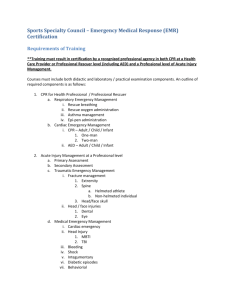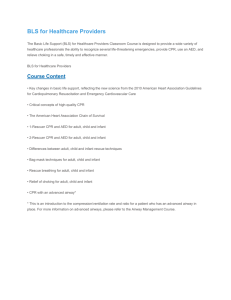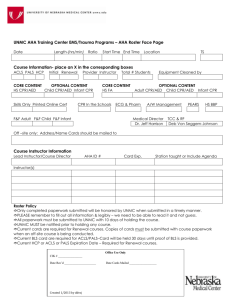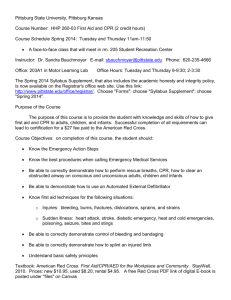HST 3120 Fall 2001 - Eastern Illinois University
advertisement
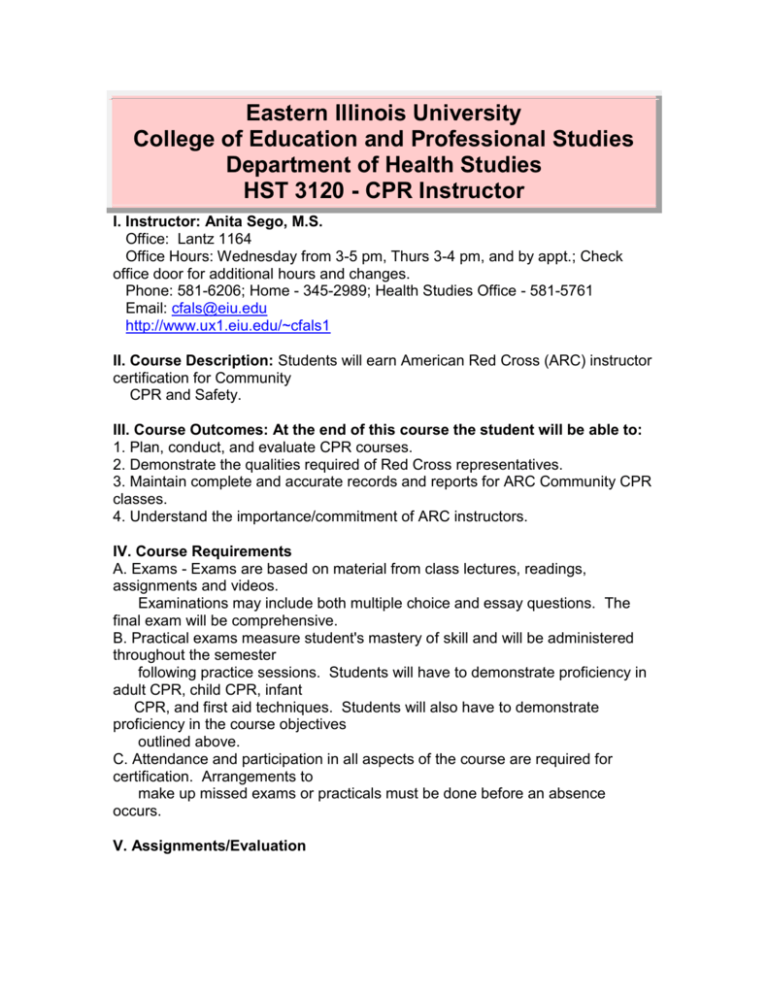
Eastern Illinois University College of Education and Professional Studies Department of Health Studies HST 3120 - CPR Instructor I. Instructor: Anita Sego, M.S. Office: Lantz 1164 Office Hours: Wednesday from 3-5 pm, Thurs 3-4 pm, and by appt.; Check office door for additional hours and changes. Phone: 581-6206; Home - 345-2989; Health Studies Office - 581-5761 Email: cfals@eiu.edu http://www.ux1.eiu.edu/~cfals1 II. Course Description: Students will earn American Red Cross (ARC) instructor certification for Community CPR and Safety. III. Course Outcomes: At the end of this course the student will be able to: 1. Plan, conduct, and evaluate CPR courses. 2. Demonstrate the qualities required of Red Cross representatives. 3. Maintain complete and accurate records and reports for ARC Community CPR classes. 4. Understand the importance/commitment of ARC instructors. IV. Course Requirements A. Exams - Exams are based on material from class lectures, readings, assignments and videos. Examinations may include both multiple choice and essay questions. The final exam will be comprehensive. B. Practical exams measure student's mastery of skill and will be administered throughout the semester following practice sessions. Students will have to demonstrate proficiency in adult CPR, child CPR, infant CPR, and first aid techniques. Students will also have to demonstrate proficiency in the course objectives outlined above. C. Attendance and participation in all aspects of the course are required for certification. Arrangements to make up missed exams or practicals must be done before an absence occurs. V. Assignments/Evaluation A. B. C. D. E. F. G. H. I. J. K. L. ARC Pre-Course Exam – 65 points FIT written Exam - 25 points Community First Aid & Safety Written Exam – 50 points Adult CPR/AED Skills Test – 10 points Infant & Child Skills Test – 10 points First Aid Skills Test - 10 points Standard First Aid Written Exam – 35 points (on WebCT) Practice Teaching I - 15 points Practice Teaching II - 15 points Teaching AED - 15 points Participation & Evaluation of Instructor Teams - 25 points Instructor Exam - 25 points Total Points Possible: 300 = C, 60% = D, 59%= F Grading Scale: 90% = A, 80% = B, 70% No instructor certification will be given for those scoring less than 80%; those not participating in three teaching scenarios; or those who fail any skill session. VI. Course Outline Date Topic/Activity 5/16 Introduction & Standard First Aid Video (Sudden Illness/Diabetes/Poisoning/Heat and Cold) 5/17 Community First Aid & Safety - Responding to Emergencies/Barriers/Preventing Disease Transmission/Checking the Victim 5/18 Conscious Choking Adult (Abdominal Thrust)/Adult Rescue Breathing/Adult CPR/Unconscious Choking Adult/Conscious Choking Child/Rescue Breathing/Child CPR/Unconscious Choking Child Conscious Choking Infant/Rescue Breathing Infant/Infant CPR/Unconscious 5/19 Choking Infant/ Bleeding/shock/wounds/Burns/Extremities/Splinting/ Sudden Illnesses (SFA Test on WebCT) 5/23 Review/Community First Aid & Safety Test/Begin Fundamentals of Instructor Training/FIT Special situations; scenarios/ 5/24 FIT - Continued - FIT Study Guide (FIT Self Study Test due on 5/26/05) 5/25 FA/CPR/AED Instructor Course (Over Blue Teaching Manual) FA/CPR/AED Instructor Course/Pre-Course Test/Scheduling and teaching 5/26 assignments for HST 1120 5/30 Memorial Day – No Class 5/31 AED Skills/ AED Teaching Skills 6/1 Instructor Exam/Final Preparation for HST 1120 6/2 1120 Begins 6/6 1120 6/7 1120 6/8 1120/AED Skills/Review for Test 6/9 FINAL EXAM VII Texts 1. American Red Cross. Fundamentals of Instructor Training Participant's Manual. St. Louis: American Red Cross. 2. American Red Cross. Community First Aid & Safety. St. Louis: Staywell. 3. American Red Cross. First Aid and CPR Instructor's Manual. St. Louis: Staywell. 4, American Red Cross. First Aid/CPR/AED Instructor’s Manual. St. Louis: Staywell. Academic Integrity: A violation of the university policy on Academic Integrity in any shape, manner, or form will result in a hearing before the Judicial Review Board. This pertains to attendance, quizzes, tests, assignments, or any material relating to this course. Students with Disabilities: If you believe you will need accommodations for disability, please make an appointment to meet with me after class. You may also wish to contact the Director of the Office of Disability Services at 581-6583. Distractions/Disruptive Behavior: A recent article in the Chronicle of Higher Education (8-8-03) cited current research that indicated that distracting and disruptive behavior is considered insulting and a barrier to a productive classroom environment. Students from the University of Arizona, the State University of New York, and the University of Oklahoma, among others, held stronger attitudes toward classroom respect and civility than even the professors! Disruptive behavior is defined as repeated, continuous and/or multiple student behaviors that hamper the ability of instructors to teach and students to learn. Common examples of disruptive behaviors include, but are not limited to: Eating in class, constant questions or interruptions that interfere with the instructor or others presentation, entering class loudly or late, loud gum chewing and popping, audible yawning, pen and pencil tapping, packing up while the professor is still speaking, body odor, skimpily clad individuals, off-topic discussions, overt inattentiveness (sleeping or reading papers in class), use of pagers or cell phones in the classroom and inappropriate demands for time and attention. To insure an overall positive environment, any such disruptive behavior will be dealt with appropriately as per university policy.
